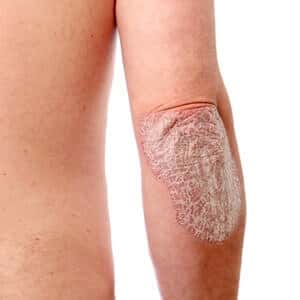
Psoriasis sucks. It is a condition that causes red, dry, scaly, itchy skin patches. There is no cure. The causes are mysterious. Scientists believe that an overactive immune system is the culprit. For reasons that remain unclear, T cells stimulate the growth of healthy skin cells. One of the newest and most popular therapies involves immune modulating drugs such as Humira or Enbrel. They’re pricey, though. A month’s supply of Humira can exceed $5,000. That’s why many people with mild to moderate psoriasis may turn to alternative treatments for psoriasis.
Does the Microbiome Affect Psoriasis?
Q. You’ve written in the past about the importance of a balanced gut microbiome for our general health. Are there studies on how poor gut health might contribute to skin disorders like psoriasis? I keep thinking this might be helpful.
A. Scientists are now investigating the links between the balance of gut microbes (the ‘microbiome’) and skin diseases such as psoriasis. One review found that dietary changes, traditional Chinese medicine and probiotics improve gut microbiome diversity and lower inflammation in psoriasis sufferers (Frontiers in Cellular and Infection Microbiology, Aug. 7, 2024). That’s a plus to considering alternative treatments for psoriasis.
Do Alternative Treatments for Psoriasis Work?
Many health professionals automatically turn thumbs-down on non-drug approaches. In our experience, dermatologists are quite skeptical when it comes to home remedies or alternative treatments for psoriasis.
A review published in JAMA Dermatology (online, Sept. 5, 2018), however, suggests that a few complementary and alternative treatment strategies do have evidence of efficacy. The dermatologists analyzed 57 clinical trials and 3 meta-analyses.
Curcumin:
The authors found that treatment with curcumin, the active ingredient in turmeric:
“conferred statistically and clinically significant improvement in psoriasis plaques.”
The dermatologists who undertook this review concluded:
“On the basis of preliminary high-quality evidence, a trial period of oral curcumin in a phospholipid-based delivery system can be recommended as an effective adjunctive treatment of psoriasis.”
Indigo Naturalis:
A traditional Chinese medicine, Indigo naturalis, demonstrated effectiveness when applied to the skin.
Here is what the dermatologists report:
“Indigo naturalis (IN), derived from indigo plants such as Baphicacanthus cusia, has been used in traditional Chinese medicine for centuries. Along with its active component indirubin, IN has shown anti-inflammatory, antiviral, antimicrobial, antipyretic, and antitumor effects via CDK2 inhibition of the cell cycle in proliferating cancer cells. Oral administration can cause gastrointestinal irritation and hepatic damage when used long term. Topically, however, IN has been shown to be a safe treatment of psoriasis.”
A randomized, double-blind, placebo-controlled clinical study published in BMC Complementary & Alternative Medicine (online Sept. 2, 2017) concluded:
“This study demonstrated the clinical efficacy of Indigo naturalis in moderate psoriasis, and exemplified a novel experimental medicine approach to understand TCM [traditional Chinese Medicine] targeting mechanisms.”
There is a downside to Indigo naturalis. It is a blue dye. That means skin will take on a blue hue. It can also rub off on sheets and clothes.
That said, some people report that it works quite well as one of the alternative treatments for psoriasis.
“Its blue pigment may affect compliance, and finding a reputable source for IN may prove to be a barrier for use because there are limited commercial sources for this product. Sources of IN can be found at traditional Chinese herb pharmacies as qing dai, but consumers should be wary of counterfeit chemical dyes.”
We can offer no insight on high-quality products containing Indigo naturalis. If you can’t find a trustworthy Chinese herb pharmacy in your neighborhood, you could search Amazon. There is no guarantee, however, that the products you find there will satisfy quality standards. Check the reviews to see if any one product stands out as beneficial.
Other Alternative Treatments for Psoriasis:
The dermatologists also listed meditation and guided imagery as potential alternative treatments for psoriasis.
They reviewed several studies and concluded:
“In conclusion, the evidence for meditation and guided imagery is based on a small number of studies with limited numbers of participants; nonetheless, early research suggests that this mind-body modality may be a beneficial adjunctive treatment as part of a holistic management approach to psoriasis.”
Finally, they analyzed data on acupuncture. They noted that:
“In conclusion acupuncture appears to be beneficial for the treatment of psoriasis.”
They point out that:
“The acupoint stimulation should be performed for a minimum of 6 weeks to achieve therapeutic effect.”
People’s Pharmacy Remedies:
We cannot offer randomized, placebo-controlled trials to back up any of these alternative treatments for psoriasis. But you may find them of interest:
How to Soothe Psoriasis with Cilantro
Can You Ease Psoriasis with Natural Remedies?
Share your own experience with psoriasis. Which medications work best for you? Have you tried alternative treatments for psoriasis? If so, how well did they work? Did you experience any side effects?
Citations
- Zou X et al, "Gut microbiota and psoriasis: pathogenesis, targeted therapy, and future directions." Frontiers in Cellular and Infection Microbiology, Aug. 7, 2024. DOI: 10.3389/fcimb.2024.1430586

